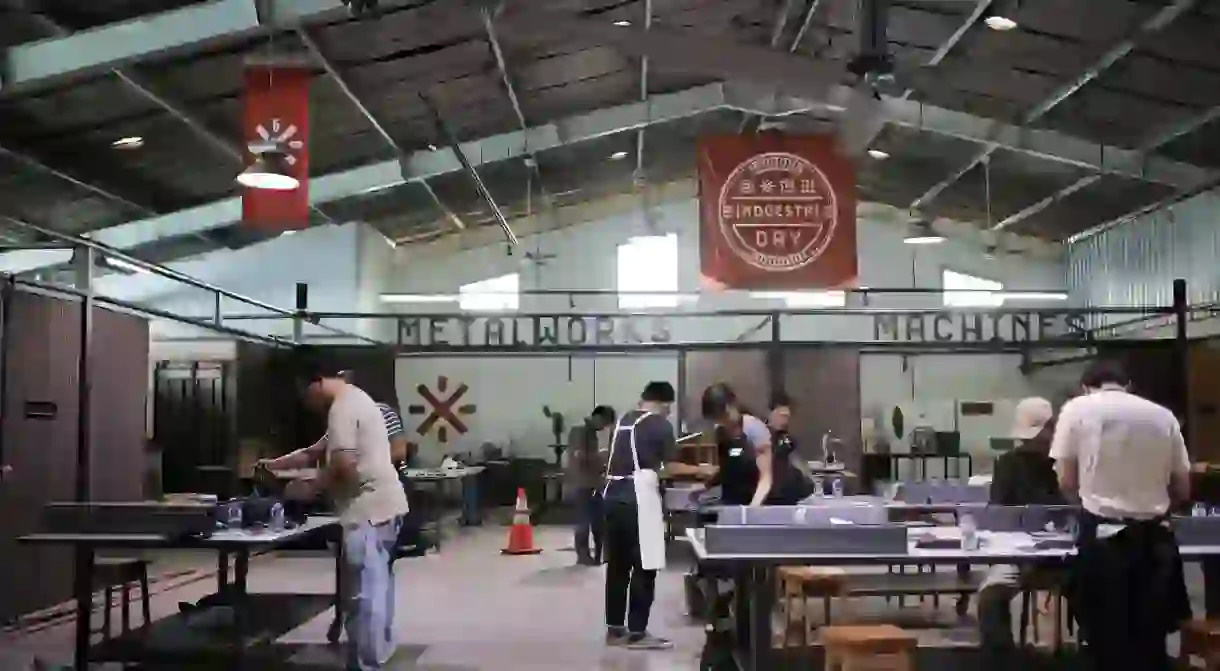This Jakarta Makerspace Is Turning Tradition on Its Head

Tucked away beside a bustling highway overpass in a former industrial area of west Jakarta, a buzz of activity inside a humble warehouse is redefining the way people perceive quality craftsmanship in Indonesia.
Established in 2014, Indoestri is a makerspace offering a broad array of classes – from traditional crafts like metalworking, woodworking and leather-making to modern-day skills like branding and social media marketing. After noticing local brands were heading in the wrong direction, lacking originality and the quality needed to compete on a global scale, founder Leonard Theosabrata decided to help nurture the creative minds behind these brands and help ensure their sustainability well in to the future. As Theosabrata explains: ‘we need to be more grass-roots: we need to be more in-depth by mentoring these brands from the beginning.’

At its core, Indoestri embodies SelfMade, a philosophy focused on empowering individuals to equip themselves with the knowledge and skills needed to turn their passions into viable brands and businesses. ‘SelfMade is about the belief in a process: to know the basic process so that you can go about building your business, and research and develop it for sustainability,’ says Theosabrata.

With a growing community of learners, makers and creative people across different areas, Indoestri has held more than 500 workshops and taught upwards of 5,000 students since its inception. Attracting a diverse audience base, from students and young professionals all the way up to 55-year-olds, the demand for its classes reflects a burgeoning culture of creative entrepreneurialism, particularly among the millennial set. ‘A lot of my friends working in corporate jobs are always like, “what should we make? I want to start my own business but I don’t know what to make.” Everyone wants to work for themselves,’ explains Janet Jane, founder of Fiber Motel, a Jakarta-based creative studio focused on the art of macramé.

Jane, who is also an instructor at Indoestri, was attracted to the makerspace because of a shared belief in the importance of understanding and valuing the creation process. ‘There are a lot of workshops these days trying to do the same things they are doing here, but I think Indoestri has really good values and the SelfMade philosophy. They only want to work with brand owners who actually know how to make their product.’
Besides leading macramé workshops every month, Jane, along with her fellow instructors, also holds live demonstrations at Indoestri Day, a biannual open day event showcasing upcoming workshops and the work of Indoestri instructors. With events like these, Jane cites the opportunity to network with like-minded people as a key benefit of working with Indoestri. ‘They’re very supportive of their students and instructors. Once you learn there, you meet people who have the same interests as you and can make invaluable connections.’

As a country that prides itself on a strong cultural heritage and its unique traditional handicrafts, Theosabrata wants the world to view Indonesia as ‘the last frontier for craft’. By bringing international guest instructors and cultural events to Indoestri, Theosabrata hopes to facilitate more cultural exchanges between Indonesia and the rest of the world. Most recently, Indoestri hosted a live performance by Circo de Sastre, a Japanese creative arts collective spanning the worlds of music, fashion, dance, circus and theatre performance to deliver multi-sensorial story-telling experiences. In conjunction with the performance, Circo de Sastre also held workshops on areas as diverse as ‘how to organise a fashion show’ and ‘how to make cross-genre art performances’.
For Theosabrata, the future of Indonesia’s creative industry lies in its ability to reimagine tradition for a new audience. ‘Tradition is not something you pass on generation after generation and you just blindly follow. We’re rebels. I’m not going to do that, but I’ll take your way and make it my way to make it relevant.’














